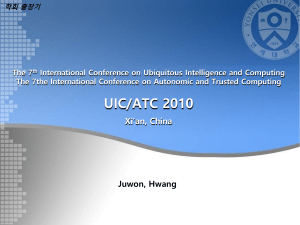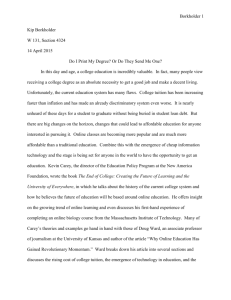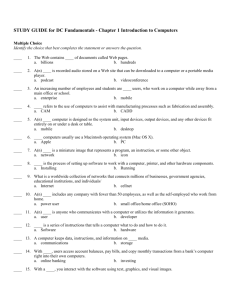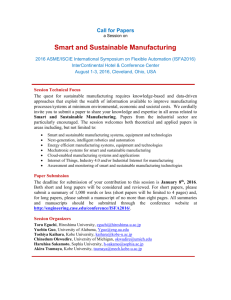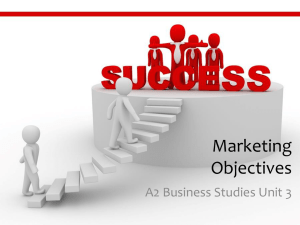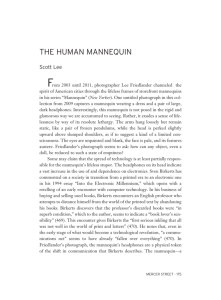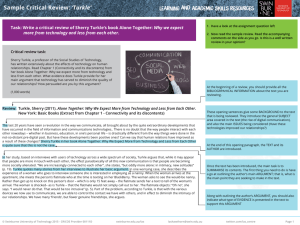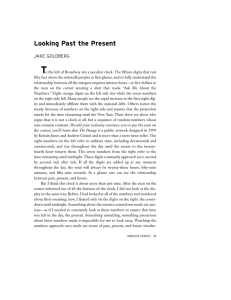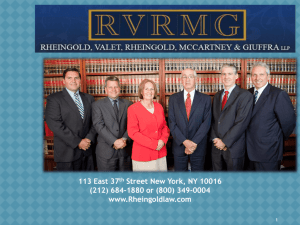Rachel Gipson - Indiana University South Bend
advertisement
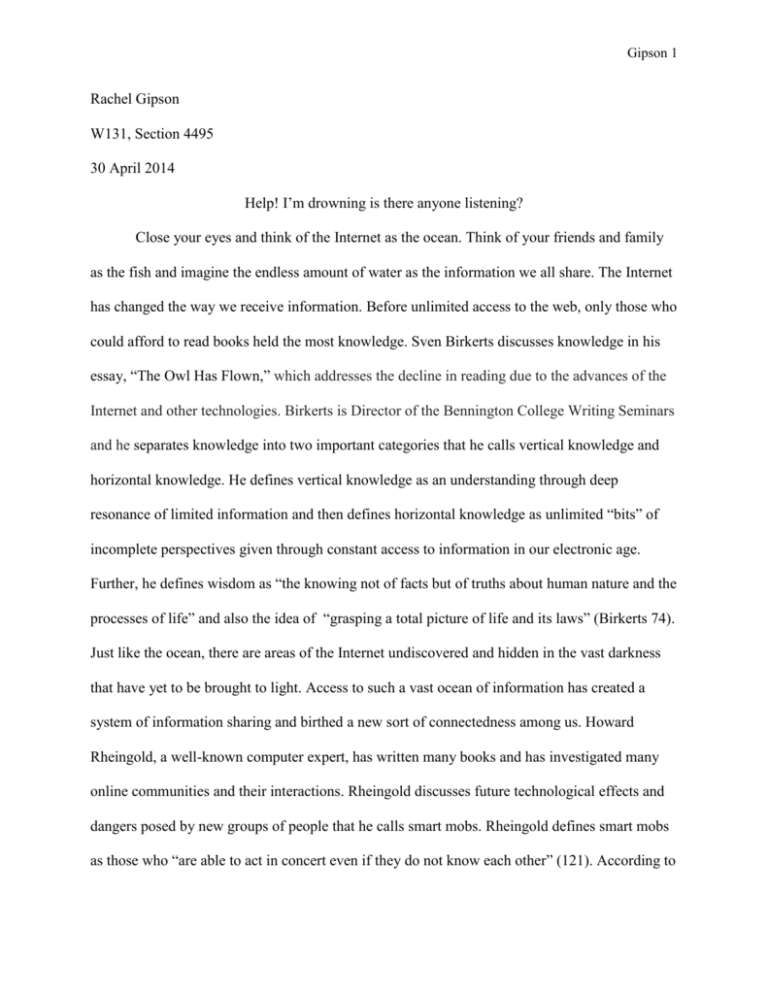
Gipson 1 Rachel Gipson W131, Section 4495 30 April 2014 Help! I’m drowning is there anyone listening? Close your eyes and think of the Internet as the ocean. Think of your friends and family as the fish and imagine the endless amount of water as the information we all share. The Internet has changed the way we receive information. Before unlimited access to the web, only those who could afford to read books held the most knowledge. Sven Birkerts discusses knowledge in his essay, “The Owl Has Flown,” which addresses the decline in reading due to the advances of the Internet and other technologies. Birkerts is Director of the Bennington College Writing Seminars and he separates knowledge into two important categories that he calls vertical knowledge and horizontal knowledge. He defines vertical knowledge as an understanding through deep resonance of limited information and then defines horizontal knowledge as unlimited “bits” of incomplete perspectives given through constant access to information in our electronic age. Further, he defines wisdom as “the knowing not of facts but of truths about human nature and the processes of life” and also the idea of “grasping a total picture of life and its laws” (Birkerts 74). Just like the ocean, there are areas of the Internet undiscovered and hidden in the vast darkness that have yet to be brought to light. Access to such a vast ocean of information has created a system of information sharing and birthed a new sort of connectedness among us. Howard Rheingold, a well-known computer expert, has written many books and has investigated many online communities and their interactions. Rheingold discusses future technological effects and dangers posed by new groups of people that he calls smart mobs. Rheingold defines smart mobs as those who “are able to act in concert even if they do not know each other” (121). According to Gipson 2 Rheingold, modern devices not only connect us together but possess “both communication and computing capabilities […] Groups of people using these tools will gain new forms of social power, just in time and just in place” (121). Devices such as cell phones, personal computers, texting and social media, such as Facebook, give us social power by the control we have over maintaining “where” and “when” we choose to interact. Another author who discusses technological devices is Sherry Turkle. She discusses new means of communication via technology in her TedTalk, “Connected but Alone?” As a social psychologist, Turkle has studied hundreds of randomly chosen people to participate in studies she performed on new avenues of communication through technology. Since we live in an electronic age with constant access to unlimited information, it has become normal practice to offload almost all responsibility onto our devices—knowledge and management of information, how we think for ourselves, our selfidentity, and our interactions. Consequently, as we trade these quality social skills and abilities for our devices, understanding the reality of the world surrounding us, truth and wisdom and the depth of our knowledge, the quality of our relationships, and privacy are being trivialized. We are redefining human connection and communication and it is only a matter of time before we start drowning in the consequences of offloading all of these responsibilities. With constant access to unlimited avenues of information in our electronic age, we no longer think for ourselves, which is redefining the way we think, how we perceive the world around us, and who manages information. Before unlimited access to the Internet, we gained information from books. We spent time reading books to learn, and the time we spent was acknowledged as a necessity for understanding. Birkerts states that this old world included vertical knowledge through reading in depth and “intensively” instead of “extensively” (72). However, with smart technologies, we no longer accept the fact that we could understand Gipson 3 something completely. Instead, we continuously search for answers from all sorts of sources and maintain only information, not truths and not wisdom. Instead of discovering the “‘truth’ of things—we direct our energies to managing information” (Birkerts 75). The Internet is changing the traditional means of how we are receiving what we feel is a well-rounded understanding of the world around us. With the constant flow of information that we are bombarded with, we cannot possibly grasp a whole picture; these endless avenues of information only ensure doubt in our understanding. Similar to Birkerts, Daniel M. Wegner and Adrian F. Ward discuss an example of modern day knowledge and information management. Wegner and Ward are two professors of Psychology from the University of Harvard. Wegner and Ward studied how access to constant streams of information sharing via the internet, or “the cloud,” effect our full perspective of the world surrounding us. This “cloud,” is a place for “sharing information online” and also for the “storage of info” (Wegner and Ward). Through many case studies Wegner and Ward found, “when we are faced with requests for information we do not know, our first impulse is to think of the Internet -- our all-knowing ‘friend’ that can provide this information to us after a simple tap of the finger or effortless voice command” (Wegner and Ward). This constant offloading of our responsibility to understand the information we manage causes us to be only reservoirs of facts and not truths. If every time we don’t know an answer we just ask Google instead of a friend, that gives Google the power to make us all think the same things and change the way we think, which is dangerous. As Rheingold mentioned, we are becoming shallow in our understanding of truths with smart technologies, such as Google and “the cloud.” Truth and wisdom of understanding life and the world surrounding us are being belittled because our immediate instinct is to seek answers and store information on the Internet. As Birkerts Gipson 4 stated, it is not only “truth that leads to wisdom,” it is also wisdom that leads to understanding of facts and the understanding of facts that allows us to rightly divide our thoughts about life. Furthermore, smart devices not only allow us to offload the responsibility for our knowledge of the world surrounding us, but to manage our personal information through social media. Many of us feel a sense of trust that the internet gives us more privacy by being able to control how much we “share” via the internet or “cloud.” Similar to Birkerts, Rheingold discusses the management of human interactions and communication on a larger scale through his concept of smart mobs. While many people are excited about technology, Rheingold is weary of new technology devices, and believes they may even contain access to social powers that could be dangerous including: capabilities used to spy, hold records, and even connect strangers. Rheingold predicted in 2002, “spying machinery [would be] built into every object we encounter,” and also that devices would leave “digital traces of our personal lives with our credit cards and Web browsers today, tomorrow's mobile devices will broadcast clouds of personal data to invisible monitors all around us” (125). In other words, while we are posting away, sharing information online, or even just buying products, we post minutely detailed records of our lives into “the cloud” and are broadcasting personal information that can be tracked by others that we do not even know. We are being tracked everywhere we go—this is a violation of privacy and is most definitely a consequence of smart devices. Neil M. Richards speaks out about danger in modern smart-technologies in the article, “The Dangers of Surveillance.” Richards is a Professor of Law at the University of Harvard who explains that private companies are currently collecting and distributing private data, or at least data that people think is private, particularly during the past fifteen years when smart technologies have been on the rise dramatically. Richard states that in the future we will be tracked everywhere we go with things like, “networked controls, sensors, Gipson 5 and data collectors” progressively built into our “appliances, cars, electric power grid, and homes” (1940). However, this is happening today and not just in the future. He says that with new technology, someone will have to maintain this information and therefore these things seen as “enabling new conveniences will be subjecting [ . . ] previously unobservable activity to electronic measurement, observation, and control. [Additionally,] many of us already carry GPS tracking devices in our pockets […] in the form of powerful multifunction smartphones.” (Richards 1940). Companies are buying information about us every second and it is entirely “legal” (Richards 1941). By offloading our intimate lives onto technology, we offload our rights to privacy as well. Rheingold and Richards discuss the reality of our privacy being tracked and sold and suggest that even our lives that we feel are private are being managed by smart technologies. It is our responsibility to maintain our privacy, otherwise the “cloud” will. Not only are our private lives being managed by the “cloud” of smart technologies, but we are also offloading our human connections and communicative responsibilities onto our devices as well. While communication used to require meeting people face-to-face, presently, new devices have shifted interpersonal interactions dramatically. For Turkle, while new technologies were exciting at first, she had some shocking reports fifteen years after she started her studies and concluded, “we're letting it take us places that we don't want to go” (Turkle). Turkle stresses that the quality of personal human interactions and communication is at risk. She defines the effects of new connections we make with people as the “goldilocks effect,” described as, “[texting, email and posting, that] let [people] present the self as [they] want to be. [People] get to edit, and that means [they] get to delete, and that means [they] get to retouch, the face, the voice, the flesh, the body --not too little, not too much, just right” (Turkle). Constant connectedness through smart mobs changes our understanding of who we are and shifts self- Gipson 6 reality through being able to edit who we want to be on smart devices. Not only do we edit ourselves online, presenting a self who is “not too little, not too much, just right ” but, this social power also allows us to be whoever we want to be, whenever we want to there, “just in time and just in place” (Rheingold 121). Similar to Turkle and Rheingold’s claims, Howard Weinberger, dot-com founder and current research fellow at the Berkman Center for Internet and Society at Harvard Law School, discusses how online identities are in flux in an essay from his piece, Small Pieces Loosely Joined. Weinberger states that online, familiar expectations of personal identity are especially disrupted. Weinberger describes Michael Ian Campbell who had a particularly interesting behavioral outcome when given the power to edit his identity online via smart technologies. Weinberger describes a story of a seemingly normal young man whose online alias was Soup81 on AOL, or America On-Line instant messenger. Weinberger describes Campbell as capable of threatening a sixteen-year-old girl, Erin Walton of Colorado, even though he was thousands of miles away and had never even met Walton. According to Weinberger, Walton attended Columbine high school and Campbell threatened the young girl only eight months after the Columbine shooting in which a pair of teenagers killed thirteen people (107). Weinberger states that Campbell typed a fake threat to Walton after finding out minimal information on her and said, “I need to finish what begun [sic] and if you go to do [go to school] I don’t want your blood on my hands” (107). While completely innocent of any physical harm, Campbell offloaded the responsibility for his actions online and behaved in a morally unsound manner because he obviously thought no major consequences could come out of it if he threatened a girl he didn’t even know. As Turkle discusses, devices allow us to present the “self” as we want to be by allowing us to edit our identity online. Similar to Turkle, Rheingold states that social power presents our interactions on devices “just in time and just in place.” Weinberger’s example of the Gipson 7 disruption of identity shows how dangerous social power can be in the wrong hands. While Campbell was innocent of physical harm, he certainly was not innocent of moral responsibility to his true identity. Similarly, while smart devices allow us to off-load responsibility for self-reality onto smart devices, these technologies also provide a flux in the quality of “family life.” Social institutions such as colleges, church, the work-place, and extracurricular activities are still relevant. However, instead of conversing together, people come to social groups and isolate themselves through texting during classes, church, work and even funerals these days (Turkle). The internet, as Wegner and Ward discuss, has become our all-knowing "friend." If this all knowing friend has everything we need, there will soon be no need for real-time relationships. Marilyn Coleman and her fellow researchers, Richard Feistman, Lawrence H. Gagnong, Tyler Jamison, professors of the University of Missouri, and Melinda Markharm, professor of Kansas State University, did many case studies on the effects of modern-day co-parenting on children. Current modern-day childrearing practices use technology to create connectedness while raising children together, while living separately. Coleman and her associates claim that divorced parents, who comprise half of all American families, can maintain family connections with the help of technology (401). Coleman and her associates state that devices that provide access to “several conversations on cell phones, [and] e-mail” made it easier for divorced parents to raise children [and maintain a good relationship] while living apart” (402). In other words, technologies helped create good childrearing practices that allow divorced parents to be together while separate. Conversely, Turkle states that during her case studies, children complained of parents on smart devices who, “text and do email at breakfast and at dinner, while their children complain about not having their parents' full attention. But then these same children deny each Gipson 8 other their full attention” (Turkle). In other words, we are denying each other the conversations we truly enjoy by trading true conversation for control over what we can say. While texting and email make many divorced families lives easier to maintain as Coleman and her researchers propose, they do not necessarily create the connectedness that Turkle discusses, and they certainly do not create the connectedness that we truly desire and deserve. Connectedness through smart technologies is a part of the electronic age in which we live. However, these devices do not have to be a normal practice. We do not have to constantly offload all responsibility to our devices. We do not have to trade our human interactions for those of our devices. Not being in control of the words that we speak can be a beautiful thing. Thinking for ourselves, interacting in real-time relationships, and talking to people we love in person is beautiful. I acknowledge that technology can be very helpful and I did not provide a solution for how to put technology into its place. However, if smart devices are changing the way we think and act and we no longer see the importance of having people to interact with, we may continue to offload responsibility onto our devices and trivialize what little truth we do know. Don’t drown in the ocean of the internet. Swim. Gipson 9 Works Cited Birkerts, Sven. The Gutenberg Elegies: The Fate of Reading in an Electronic Age: The Owl Has Flown. Boston: Faber and Faber, 1994. Print. Coleman, Marilyn, Richard Feistman, Lawrence H. Gagnong, Tyler Jamison, and Melinda Markham. "Communication Technology And Postdivorce Coparenting." Family Relations 61.3 (2012): 397-409. SocINDEX with Full Text. Web. 7 Apr. 2014. Rheingold, Howard. “How to Recognize the Future When It Lands on You” English W131 Reader Anthology. Ed. Writing Program Indiana University South Bend. New York. McGraw Hill, 2012. 120-127. Print. Richards, Neil M. "The Dangers of Surveillance." Harvard Law Review 126.7 (2013): 1934- 1965. Business Source Premier. Web. 14 Apr. 2014. Turkle, Sherry. "Connected, but Alone?" © TED Conferences, LLC, 1 Feb. 2012. Web. 07 Apr. 2014. Wegner, Daniel M., and Adrian F. Ward. "How Google Is Changing Your Brain." Scientific American 309.6 (2013): 58-61. Academic Search Premier. Web. 31 Mar. 2014. Weinberger, Howard S. “Selection from Small Pieces Loosely Joined” English W131 Reader Anthology. Ed. Writing Program Indiana University South Bend. New York. McGraw Hill, 2012. 107-112. Print.

